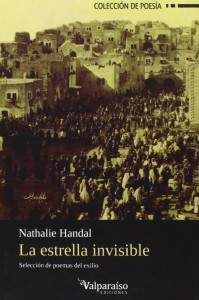By: Nathalie Handal
Reviewed by: Dana Doulah
 Nathalie Handal’s latest collection of poetry, The Invisible Star, is “a masterpiece,” as the famed Chilean writer Raúl Zurita lauds. Bethlehem is the heartbeat of this bilingual English/Spanish volume. It is divided into two parts, “A City, Bethlehem” and “Cities, The Star in Latin America,” and ends with a series of qit’as entitled “The City of Crosses.” Handal introduced qit’as – which means “fragment” and is a short poem in the Arabic tradition – to Western readers in her previous collection, Poet in Andalucía. Every poem in this book is a celebration and a wound that transcends borders, and perhaps time. It’s a voyage that is literal and metaphorical, symbolic and ethereal.
Nathalie Handal’s latest collection of poetry, The Invisible Star, is “a masterpiece,” as the famed Chilean writer Raúl Zurita lauds. Bethlehem is the heartbeat of this bilingual English/Spanish volume. It is divided into two parts, “A City, Bethlehem” and “Cities, The Star in Latin America,” and ends with a series of qit’as entitled “The City of Crosses.” Handal introduced qit’as – which means “fragment” and is a short poem in the Arabic tradition – to Western readers in her previous collection, Poet in Andalucía. Every poem in this book is a celebration and a wound that transcends borders, and perhaps time. It’s a voyage that is literal and metaphorical, symbolic and ethereal.
In the first part, the poems are exquisite dream-like portraits of the city where Jesus was born. And some inform us about the poet. She tells us how deeply Bethlehemite she feels in “Talhamiyeh”: “I’m an Arab, / the seven quarters / of the old city has left me seven keys / so I can always enter.” Then she takes readers to the streets of her city, beginning with the sacred, “an olive tree can open us,” to “hearts…housing maps” to confessions and what Palestinians know too well, that all walls have “no ideas or love.” And reminds us in “Resurrection,” that whatever we chose, “silence or noise,” “the aloneness of travelers” or remembrance, “our eyes widened in the light” and the light will keep opening the city.
It is a city that forever breathes inside Bethlehemites, wherever they might be, as she tells us in part two of this indispensable collection. Handal draws a map with words, and offers us a compass. She takes us to Cuba’s “La Casa de los Arabes,” to her father’s “divided heart” in the Dominican Republic; then to the “Sad Carver of Crosses” in El Salvador before making us pause with “Juan Rulfo, the Ghosts, the Arabs and the House” in Mexico. Next we find ourselves with a sculptor from Star Street exiled in Nicaragua and Mamoun exiled in Brazil; followed with a stop in Barrio Patronato, an Arab neighborhood in Chile, another in Colombia, where mother-of-pearl crafters have found refuge, before reaching Habib and Walid drinking ahweh in Peru. These poignant portraits of people and places on her journey are united in the line: “we saw our country in each other’s eyes.” In “Turka,” she echoes her experience as an Arab in Latin America, and the poem is in conversation with “Talhamiyeh.”
The final series of qit’as is a suite of displacement. It presents the many seas that exiles have had to traverse since British colonization, the Nakba, and onward –Marseilles, Cairo, London, and more. The celebrated poet herself grew up in France, Latin American, the United States, and the Arab world. But despite the trauma, she ends the qit’as with what she presented to us as we entered the book, a chariot, and her words accompany us: “I know every syllable of my name / in Arabic, / every word is a direction.”
Handal has been described as “one of today’s most diverse writers,” and this collection is her most intimate. It transforms Palestinian-ness into undividable light.
» Dana Doulah is an art and poetry enthusiast based in Jerusalem. She holds a master’s degree in English literature. She currently works as a content quality assurance analyst with Thomson Reuters.
Valparaiso Ediciones, 1st edition (2014)
172 pages, $18.00
